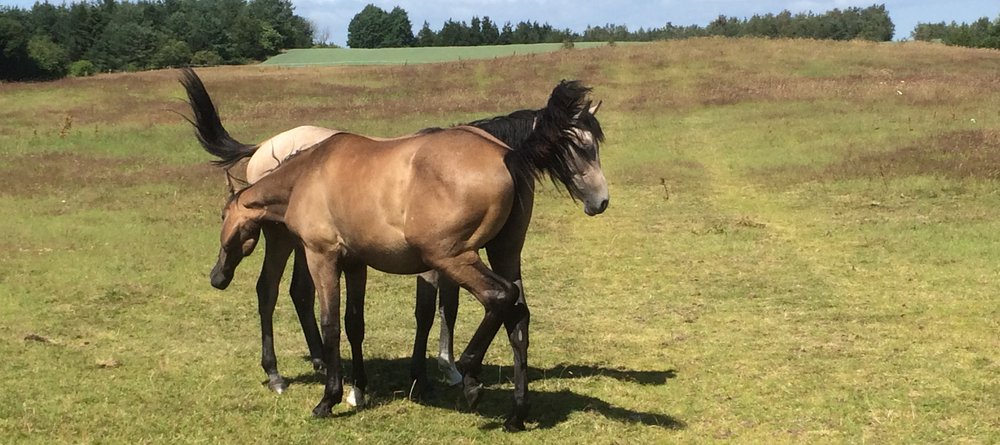A new project focuses on insect harassment of horses on pasture
Horses benefit from grazing – both in terms of their physical and psychological well-being. However, insects and summer heat can affect and may be a threat to the horses’ welfare. A new project at AU Foulum investigates the occurrence of insects and the importance of shade.
![[Translate to English:] Det kan være surt at være hest i sommervarmen på grund af generende insekter. Foto: Janne W. Christensen. [Translate to English:] Det kan være surt at være hest i sommervarmen på grund af generende insekter. Foto: Janne W. Christensen.](/fileadmin/news_import/Hest_insekt.jpg)
Climatic changes means that horses on pasture experience more warm periods and an increased load of insects, which may be carriers of pathogenic microorganisms. Furthermore, blood-sucking and biting insects are stressful to the horses due to the irritation and itch. This can result in wounds and allergy, which reduce the horses’ welfare. Therefore, effective solutions for shade and insects are required for horses on pasture.
Hence, AU Foulum has initiated a new research project, which gathers new knowledge about the coherence between the occurrence of insects, weather conditions and stress in horses measured as stress hormones and insect-related behaviour.
“The aim of our study is to find good, practical solutions for horse owners, which can minimise the stress from insects as much as possible under Danish conditions”, says project leader Janne W. Christensen, Department of Animal Science, Aarhus University.
The research project is divided into two phases
During the first phase, data are collected from 10 herds of which 5 herds have access to buildings and sheds, and 5 herds do not. The data collection runs during the entire summer period in order to cover periods with distinct activity of various insect species, for example horseflies and mosquitoes.
During the second phase, the researchers will contact 40-50 herds to gather experiences from practice with horses’ use of buildings/sheds during the summer period as well as the owners’ experiences with other initiatives on how to reduce the load of insects, for example the H-trap, use of summer horse blankets and Pour-On remedies. All the experiences from phase two are gathered in an idea catalogue.

Large-scale data collection
The researchers will continuously collect the following data in the project:
- The horses’ use of buildings/sheds and naturally existing shade/windy areas are recorded by direct observations and by means of wildlife cameras
- Occurrence of insects (number and species) is recorded by means of installed traps in buildings and in the outdoor area. Furthermore, quantitative data are collected via visual observations of selected groups of insects on horses
- Weather conditions (temperature, humidity, precipitation and wind speed) are recorded by means of installed weather stations
Other continuous registrations:
- Faeces for measuring stress hormones
- Surface temperature and respiration rates are measured for all horses
- Insect-related behaviour (for example swishing the tail, shaking the head, itching, pinching on the body) is recorded on selected days and times in all herds
“These data will give us the possibility to compare periods of high insect density with periods of low density in relation to the use of indoor areas and/or naturally existing shade or more windy areas”, says Janne Winther Christensen.
“Besides, we will also identify the insects in order to obtain knowledge about which species cause the most inconvenience to the horses. Based on this data, the project is to result in recommendations and strategies on how horse owners can prevent insect inconvenience, hence increasing the welfare of their grazing horses”, concludes Janne Winther Christensen.
The project is funded by the Horse Levy Fund and the Qato Foundation and runs during 2019-2020. The project is carried out in cooperation with Department of Agroecology, Aarhus University.
Further information
Janne Winther Christensen, Department of Animal Science, Aarhus University
Email: jwc@anis.au.dk
